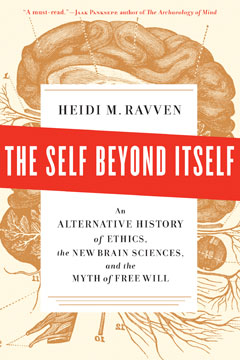The Self Beyond Itself
A groundbreaking book on how new developments in neuroscience challenge our basic assumptions about morality
“Why be ethical? For freedom’s sake; for joy, for pleasure, for a sense of living on in the universe of which one is a tiny, local expression; and for an enhanced sense of agency in a dangerous, unpredictable, and ephemeral existence. . . . Opening oneself to being more broadly acted upon by the world in order to discover oneself within it surely as a basis for acting more broadly within it is a paradoxical route to freedom.” —from The Self Beyond Itself
Few concepts are more unshakable in Western culture than free will, the idea that people are fundamentally free to make good or bad decisions. Scholar Heidi M. Ravven throws a wrench into this conventional view, calling free will a myth that reflects the still-powerful influence of Christian theology on our popular thinking.
The Self Beyond Itself offers a riveting and accessible review of modern neuroscientific research into the brain’s capacity for decision-making—from mirror neurons and self-mapping to surprising new understandings of the dynamics of group psychology. Ultimately, this research points to the profound, virtually inescapable social influences on moral choices. Ravven shows that it is possible to build a theory of ethics that doesn’t rely on free will yet still holds both individuals and groups responsible for the decisions that help create a good society. Drawing especially on the work of Spinoza, she introduces readers to a rich philosophical tradition that finds uncanny confirmation in modern neuroscience.
Highly readable and wide-ranging, The Self Beyond Itself injects the full weight of philosophy and modern science into our current, stale discourse on right and wrong.
Praise
|
|


